Top Cloud ERP Vendors & ERP Software Solutions for SMB's in 2026
Finding the perfect cloud Enterprise Resource Planning (ERP) vendor in 2026 can feel like searching for a needle in a tech-filled haystack. With top...
37 min read
KPC_Admin : Updated on January 5, 2026

Is Your ERP Strategy Future-Ready? The Top Solutions for 2026 and Beyond:
Selecting the right ERP solution providers and ERP software vendors has become a critical decision for organizations navigating digital transformation. With the global ERP market projected to reach **$140 billion by 2030 **according to Fortune Business Insights, the choices are expansive—but not without complexity. Whether you’re comparing top ERP vendors, evaluating ERP solution providers, or debating between upgrading a legacy system and implementing a new cloud-based ERP, the decision impacts everything from operational efficiency to long-term scalability.
Consider this: A Gartner study shows that over 70% of ERP projects will fail to meet expectations. Analysts note that common causes include mismatched solutions or poor implementation strategies, which highlights the importance of choosing the right ERP solution provider. How can businesses avoid these pitfalls? The answer lies in understanding the unique capabilities of today’s ERP solution providers. From SAP’s cutting-edge S/4HANA to Oracle Fusion’s comprehensive cloud offerings, the options are vast, each catering to specific industries, scales, and business complexities.
In this guide, we’ll break down the leading ERP solutions for 2026, spotlighting key features, pricing models, and customer insights. You’ll gain actionable advice to help you align ERP capabilities with your organizational goals and ensure a successful transformation.
ERP solution providers deliver software suites that automate core business processes like accounting, HR, inventory, and customer management. Acting as a central hub, these solutions connect different departments and ensure consistent, real-time data sharing. It’s no wonder that 66% of organizations report improved efficiency after choosing the right ERP solution provider. By cutting silos, eliminating repetitive tasks, and providing visibility into critical data, ERP solution providers help companies boost productivity and focus on growth.
Beyond efficiency, the right ERP provider offers scalability and flexibility. Modern solutions allow businesses to add new modules and users as they expand, making ERP not just a short-term fix but a long-term growth partner. Many providers now offer cloud-based ERP, lowering upfront IT costs while giving teams secure access from anywhere. This accessibility levels the playing field for small and midsized businesses that once couldn’t afford enterprise-level tools.
ERP solution providers also play a strategic role in decision-making. With advanced analytics and reporting, businesses can generate real-time insights into performance, spot trends, and adapt faster to market changes. This agility is crucial as organizations head into 2025, where customer demands and global competition continue to evolve.
Company Profile:
Headquarters: Austin, TX
Ownership: Public
Stock Ticker: NYSE: ORCL
Number of Employees: 135,000
Annual Revenue: $39.5B
It should come as no surprise that Oracle stands as one of the top ERP software vendors on the market today. As the second-largest software company in the world by revenue and market capitalization, Oracle develops applications and tools for database development, Enterprise Resource Planning (ERP) software, Human Capital Management (HCM), and Supply Chain Management (SCM) software.
Oracle’s dominant market share in the ERP industry is largely influenced by several notable acquisitions including PeopleSoft (including JD Edwards) in 2005, Siebel in 2006, and later NetSuite in 2016.
While Oracle receives substantial revenue from legacy on-premise ERP products such as Oracle E-Business Suite, PeopleSoft, and JD Edwards, the major focus of Oracle sales and marketing is spent promoting its “born in the cloud” ERP portfolio, including NetSuite, the #1 selling cloud-based ERP for the SMB/ MME marketplace.
Oracle Cloud-based ERP Applications:
-1.png?width=600&height=452&name=rubinbrown%20(4)-1.png)
As a leading ERP vendor in 2025, Oracle's suite of ERP software solutions, including the highly acclaimed Oracle Fusion Cloud ERP, stands out for its comprehensive capabilities in financial management, supply chain management, and risk management. Oracle's cloud ERP offerings, particularly Oracle Fusion, are a testament to its position as a top ERP vendor, providing enterprise-level businesses with a powerful ERP platform designed for scalability and innovation in the ERP software market.
While Oracle Cloud is a great ERP system, some potential areas of concern have more to do with who is and isn’t a good fit for Oracle Cloud ERP. Companies that have complex manufacturing needs or global supply chains are likely not a great fit (today) for Oracle Cloud ERP. While Oracle Cloud is highly capable there could be better, more mature options to address these specific areas.
Areas of concern: Some of the common customer complaints revolve around lackluster technical support, long/expensive implementations, and a partner ecosystem still learning the ins and outs of Oracle Cloud ERP.
Oracle Cloud ERP Pricing: Some online resources claim Oracle Cloud ERP pricing starts at $175/month/user. However, with any tier 1 ERP solution, you can expect to spend a couple hundred thousand to well over a million dollars for the software and services.
Oracle Fusion Cloud Customer Reviews:
“Oracle ERP cloud is a full comprehensive solution that has the capability to cover all our business needs. For a company like us that implemented the solution more than 3 years ago, there are 2 main added value points that we appreciate: 1. The setup steps to cover new business requirements are supported with rich documentation and a shared knowledge. 2. The extensions powered by a comprehensive set of REST API enable the solution to be adjusted to all new business needs.” Source: Gartner Peer Insights
Oracle Areas of Concern
One of the paramount challenges is the complexity of integrating Oracle Fusion Cloud ERP with existing systems. Many businesses operate on a patchwork of legacy systems and applications, and the task of integrating these with a new cloud-based solution can be daunting. The technical challenges, coupled with the need to ensure data consistency and real-time synchronization across platforms, necessitate a well-thought-out strategy and possibly, assistance from integration experts.
Data migration is another significant hurdle. Moving critical business data from legacy systems to Oracle Fusion Cloud ERP requires meticulous planning to prevent data loss, corruption, or breaches. Moreover, given the sensitive nature of the data involved, security remains a paramount concern. Businesses must ensure that their data is protected against unauthorized access and cyber threats, both during the migration process and post-implementation.
The success of Oracle Fusion Cloud ERP implementation is also heavily dependent on user adoption. The transition to a new ERP system can be met with resistance from employees accustomed to existing workflows and interfaces. Overcoming this resistance requires comprehensive training programs tailored to different user groups within the organization. Additionally, ongoing support and resources are essential to help users navigate the system, troubleshoot issues, and fully leverage the ERP's capabilities.
While Oracle Fusion Cloud ERP offers extensive out-of-the-box functionality, most businesses have unique processes that require customization. Customizing the ERP to meet specific business needs without compromising the system's integrity or upgrade path is a delicate balance. Furthermore, as businesses grow and evolve, the ERP system must scale accordingly. Ensuring that Oracle Fusion Cloud ERP can accommodate future growth and changes in business processes is crucial for long-term success.
-1.png?width=600&height=454&name=rubinbrown%20(5)-1.png)
Purchased by Oracle in 2016, NetSuite ERP is a cloud-based enterprise resource management platform that improves businesses’ effectiveness, automates core processes, and provides operation-wide visibility. Users can pick and choose advanced modules à la carte to create their own custom-tailored ERP solution.
While Oracle Cloud ERP and NetSuite do overlap in some functionality, NetSuite is really directed at companies that have outgrown entry-level accounting systems such as QuickBooks or Great Plains and looking for a more robust cloud-based ERP solution that can help them scale, while providing greater visibility organization-wide.
Oracle NetSuite Customer Reviews:
“NetSuite offers an infinitely expandable product to our adjust for future business needs and future systems users/employees capabilities. They are also constantly improving the product offering to enabling us to leverage new technology with low implementation costs… ” Source: Gartner Peer Insights
NetSuite Areas of Concern
NetSuite is a robust ERP system that offers a wide range of features and functionality for sales and financial operations. Many users appreciate its ability to handle complex processes, such as Orders to Cash and Procure to Pay, while capturing substantial amounts of data for subsequent reporting and analysis.
However, some users have expressed concerns about the implementation process and training provided by NetSuite. They feel that there is a lack of sufficient analysis of existing workflows by NetSuite subject matter experts, leading to inadequate guidance on how to adapt the system to their specific needs. Additionally, users have reported that the basic training provided is more of a demonstration of default features rather than a tailored approach to their configured environment.
Another point of concern is the need for extensive customization and creation of reports and searches. Many users have found that the built-in reports are too basic and generic to provide meaningful information, requiring them to create custom reports from scratch. This can be time-consuming and may require additional resources or expertise.
Some users have also encountered glitches and system errors that the support team may not fully understand or resolve quickly. The need to manually switch between different roles and log in and out to access certain features has also been cited as an inconvenience.
Additionally, cost is a common concern for NetSuite users. While the platform provides significant value, some businesses find the NetSuite pricing model—particularly license costs and renewal fees—to be higher than expected. NetSuite’s per-user pricing structure, combined with additional fees for premium support, advanced modules, and customizations, can make total ownership costs difficult to predict. Companies that require substantial modifications or integrations may face unexpected expenses, especially during implementation or when scaling their operations.
Despite these challenges, many companies have found that NetSuite solves various problems, such as replacing outdated or unsupported systems, providing a centralized platform for multiple business functions, and offering robust search and reporting tools for customer relationship management (CRM).
What Do the Analysts Say?
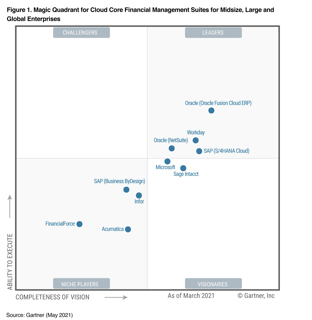
Oracle has continued to receive the highest marks from reputable industry analysts, such as Gartner’s Magic Quadrant report that comes out each year.
Most recently, both Oracle’s Fusion Cloud ERP and NetSuite were featured in the top right (the best) quadrant for “Cloud Core Financial Management Suites for Midsize, Large and Global Enterprises,” with Workday and SAP S/4 HANA trailing closely behind.
To have two products featured in the Leader category shows Oracle’s commitment to bringing best-in-class cloud-based ERP solutions to the market that are highly capable of providing tremendous value to the organizations that use them.
Company Profile:
Headquarters: Waldorf, Germany
Ownership: Public
Stock Ticker: NYSE: SAP
Number of Employees: 100,330
Annual Revenue: $32.15B
SAP, synonymous with enterprise resource planning, continues to dominate as a top ERP vendor with its expansive ERP software solutions. SAP S/4 HANA, a flagship ERP product, showcases SAP's commitment to delivering best ERP software that caters to the intricate needs of large, global enterprises, further solidifying its place in the top 10 ERP rankings for 2025.
.png?width=500&height=500&name=Rubinbrown%20assets%20(60).png) All three ERP applications are great solutions for companies that are looking for an integrated solution tying together financial, inventory, supply chain, project, and staffing data to drive better decision-making and visibility to the organization.
All three ERP applications are great solutions for companies that are looking for an integrated solution tying together financial, inventory, supply chain, project, and staffing data to drive better decision-making and visibility to the organization.
All of these ERP products can be deployed using HANA, SAP’s multi-model database that stores information in memory instead of on a disk, which allows for real-time analytics even for large businesses with massive amounts of data/transactions.
SAP Cloud ERP Products
-1.png?width=600&height=371&name=rubinbrown%20(6)-1.png)
S/4 HANA is SAP’s flagship cloud-based ERP product (that can also be deployed on-premise). SAP S/4 HANA is built on the HANA database, giving SAP less dependency on competitor databases and providing groundbreaking performance, especially for companies storing massive amounts of data and transactions. While S/4 is SAP’s tier 1 ERP, it’s not designed for just any type of business; it's best for organizations that are large, complex, and global in nature (and have a seven-figure ERP budget).
SAP S/4 Pricing: Like many ERP companies, SAP does not publicly disclose list price information for S/4HANA ERP. However, as with most tier 1 ERP systems, you should anticipate a high six- to seven-figure ERP budget to implement S/4HANA.
SAP S/4HANA Customer Reviews: “SAP S/4HANA is one of the best enterprise resource planning system that I have worked with, because its operation is very potential to carry out tasks with high precision and high performance, its flexibility has delighted us because this allows the system to adapt easily to all our needs of use, it is a very practical and very updated system, I really describe sap s/4hana as the best among all its competitors” Source: Gartner Peer Insights
SAP S/4 Areas of Concern
SAP S/4HANA Cloud has garnered attention from users for its comprehensive set of applications that help manage various aspects of a business. Many users appreciate the software's ability to integrate financial analysis, centralized accounting, and extensive professional advisor networks into each module. The system's centralized data and transactions, highly integrated business process support, and multiple data flows have been praised for helping companies manage their operations effectively and minimize financial, accounting, or transactional issues.
Users have also commended SAP S/4HANA Cloud for its real-time analytics capabilities, which leverage intelligent technologies like AI and machine learning to enhance decision-making and automation. The cloud deployment model has been appreciated for its scalability, accessibility, and potential to reduce infrastructure costs.
However, some users have expressed concerns about the complexity of the system and the potential adjustments required when adopting SAP S/4HANA Cloud. The software's interface has been described as difficult to understand, and its initial configuration often requires the assistance of professionals, which can be costly and time-consuming. Some users have also noted that customization options are limited, and complex pricing and manufacturing processes can be challenging to set up.
Another point of concern is the high cost of the system. While SAP S/4HANA Cloud offers a wide range of functions and applications, its price point may be prohibitive for some companies, forcing them to opt for lower plans with fewer options.
Despite these challenges, many users have found that SAP S/4HANA Cloud has helped them solve various problems, such as the lack of real-time insights, slow materials requirement planning (MRP) runs, and inefficient billing processes. The software has been credited with accelerating sales decision-making, improving inventory management, and streamlining logistics and order fulfillment.
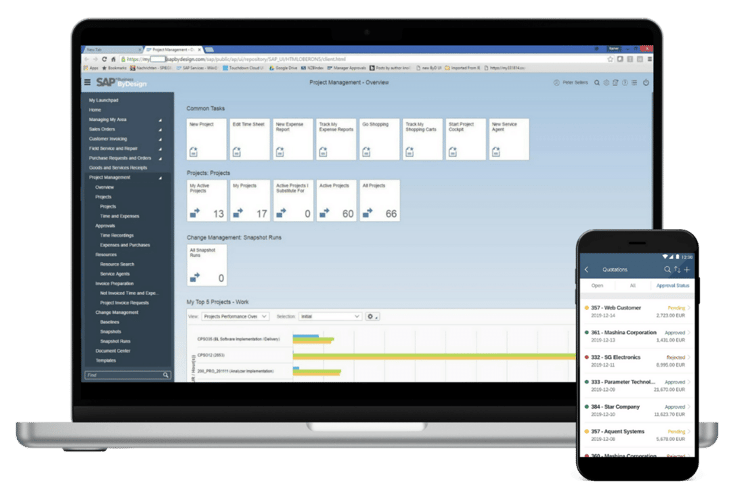
SAP Business ByDesign had a rocky start with its initial introduction to the marketplace and actually claimed to stop further development of the ERP solution back in 2013. It used to be the butt of jokes by industry leaders such as Zach Nelson (former NetSuite CEO). That being said, SAP in recent years has continued to increase R&D investment into ByDesign and was recently acknowledged by Gartner, as a “Niche Player” in their annual Magic Quadrant analysis.
SAP Business ByDesign Pricing: The monthly base package fee starts at $1,818 which includes two advanced users and three core users. Additional core users cost $120 per month, and any additional advanced users cost $217 per month.
SAP ByDesign Customer Reviews: “Use this to manage our financials and production tracking for materials, build instructions, quality checks, part ordering and product management. It is easy to use and input information into for BOM, and for searching to find items.” Source: Gartner Peer Insights
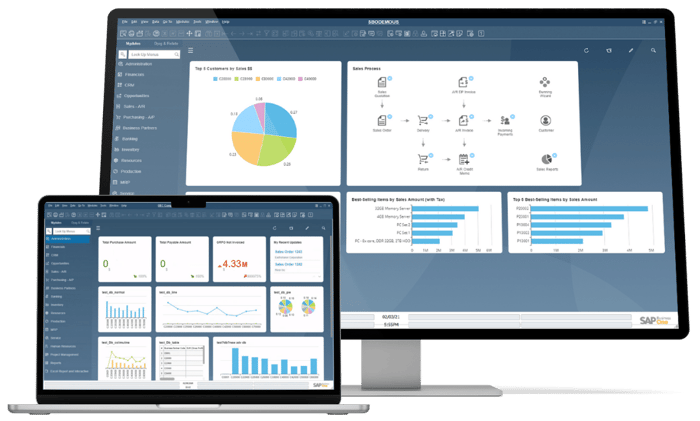
SAP Business One is a complete all-in-one ERP solution designed for SMB-sized companies that can be deployed both in the cloud and on-premise. SAP is very popular among small manufacturing and distribution companies in Europe and North America and tends to compete well with ERP products like Oracle NetSuite and Sage Business Cloud. It’s best suited for companies with limited financial complexity that need highly capable supply chain and inventory tracking capabilities, which Business One delivers.
SAP Business One ERP (Cloud) Pricing: SAP BusinessOne offers three different tiers of licenses: Professional, Limited, and Starter.
Most SAP Business One projects will be in the ~$75k-$150k price range for both the initial software subscription and implementation and support services.
SAP BusinessOne Customer Reviews: “SAP All-in-one is a very good integrated Enterprise Resource Planning(ERP) solution. We are using it from one year and its provides us everything including customer management, construction accounting, and service management modules etc. It helps a lot in growth of business and its features like data analysis and user security are really great. SAP All-in-one providing a very good data processing speed and it easily integrates. ” Source: Gartner Peer Insights
Company Profile:
Headquarters: Redmond, WA
Ownership: Public
Stock Ticker: NASDAQ: MSFT
Number of Employees: 156,439
Annual Revenue: $143.02B
Microsoft's Dynamics 365, with its robust ERP and CRM functionalities, is tailored for businesses seeking a comprehensive ERP system that integrates seamlessly with other Microsoft products (e.g. Microsoft Office). As a software vendor in the ERP software market, Microsoft has made significant strides with Dynamics 365, positioning it as a top ERP choice for businesses aiming to leverage cloud-based ERP solutions for enhanced operational efficiency.
The origins of Microsoft Dynamics ERP can be traced back to a series of calculated acquisitions made by Microsoft, which included entities such as Navision, Axapta, and Great Plains, among others. These acquisitions were not mere additions to Microsoft's portfolio; they represented a strategic move to consolidate the best features, capabilities, and technological frameworks of these legacy solutions into a unified, more powerful ERP system. Each of these acquired companies brought their unique strengths to the table—for example Navision was known for its strong European market presence and innovative financial management solutions; Axapta offered advanced manufacturing and services management features; and Great Plains was renowned for its flexible accounting software solutions tailored for small to medium-sized businesses.
Microsoft's vision was to combine the core functionalities and the best aspects of these systems to forge a comprehensive ERP solution that would not only cater to a broad spectrum of business needs but also be future proofed. The culmination of this vision was Dynamics 365, a platform that combined traditional ERP and customer relationship management (CRM) functionalities with modern cloud services and artificial intelligence (AI) features. This integration was purpose-built for cloud deployments, ensuring scalability, flexibility, and accessibility for businesses transitioning to or operating in the cloud.
In addition, Microsoft Dynamics 365 leverages the power of Microsoft's cloud platform, Azure, to offer enhanced security, performance, and innovation. The integration with Azure and other Microsoft productivity tools, such as Office 365, provides a seamless user experience and facilitates greater collaboration across different business functions. The AI-driven insights generated by Dynamics 365 help businesses anticipate customer needs, optimize operations, and make informed decisions, thereby creating a competitive edge in the market.
.png?width=700&height=394&name=Dynamics-365-Business-Central%20(1).png)
Deployment Possibilities: Dynamics 365 Business Central offers businesses the flexibility to deploy in the cloud, on-premises, or in a hybrid setup, allowing them to select the deployment approach that aligns best with their requirements.
Dynamics 365 Business Central Pricing: Dynamics 365 Business Central offers three different tiers of licenses: Premium, Essential, and Team Members.
Dynamics 365 Business Central Customer Reviews:
“Microsoft’s 365 ecosystem has matured across the entire portfolio and has led to Microsoft becoming a formidable player throughout the technology stack, even in niche solution areas. Microsoft Dynamics Business Central seems to be designed by people who actually understands what businesses need from technology vendors. ” Source: Gartner Peer Insights
Business Central Areas of Concern
Some users have raised concerns regarding certain functionalities of Microsoft Dynamics 365 Business Central. They have pointed out the lack of features like one-click journal entry reversals and easy attachment of supporting documents to journals. Additionally, feedback suggests that the Purchasing module can be cumbersome compared to rival products, and there is a noted overlap in responsibilities between administrators and accounting teams, potentially causing delays in projects.
Criticism also surrounds the mobile app, with users reporting issues with its performance and speed. Moreover, the cost of data storage limits may pose challenges for businesses requiring extensive storage capacity.
However, despite these challenges, many users have discovered that Microsoft Dynamics 365 Business Central effectively addresses various business needs, such as customer management, financial forecasting, and sales projections. The platform offers valuable insights through intuitive dashboards and user-friendly reports, empowering users to make informed decisions and enhance transparency within their operations.
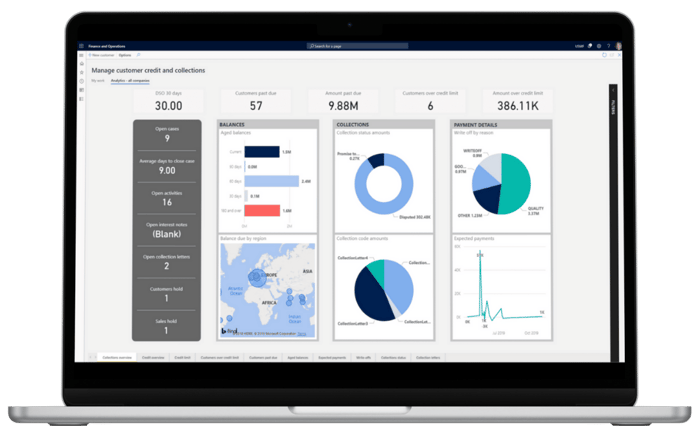
Dynamics 365 Finance & Operations is a robust ERP solution, strategically positioned to rival other tier 1 ERP systems like SAP S/4 HANA and Oracle Fusion Cloud ERP. It is best suited for large enterprises with intricate operations and a global presence, making it a more suitable choice over Business Central.
The Dynamics 365 products offer several pros including product flexibility, extensibility, and a vast ecosystem of VARs and ISVs that can fine-tune an ERP solution for most industries. Some cons for Dynamics 365 are that it’s not as robust as other ERP solutions that excel with high-volume distribution and/or complex manufacturing. Another con with Dynamics 365 is that with its extensive technical capabilities, finding the right partner to assist with change management is equally important as finding a partner with the right technical capabilities.
Dynamics 365 Finance & Operations Pricing:
Finance & Operations are licensed as two separate applications: Finance and Supply Chain Management.
Dynamics 365 Business Central Customer Reviews:
“It is a excellent ERP solution for business purpose, The platform is very stable as it is provided by Microsoft and the continuous and rigorous support increases the performance capabilities.one of the most used feature is the advance accountancy with intercompany benefits to enhance the chances of overall effectiveness and efficiency at the same time in the organization. It is also very vey customizable at the same time and customize the client batches how you want to send the information to them. It is also multi device tool so regardless of how we access and use the systems anywhere and anytime we would be experiencing the same fluid experience along with same safety . It helps to integrate all the multiple products and services we use in a very easy to use and understandable way. ” Source: Gartner Peer Insights
What Do the Analysts Say?
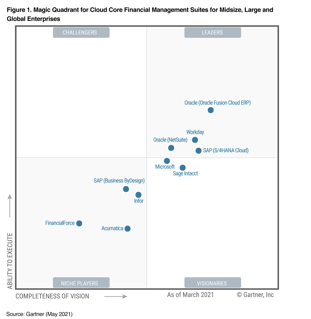
Microsoft Dynamics 365 was just on the cusp of being listed as a Leader in Gartner’s Magic Quadrant for Cloud Core Financial Management Suites in 2021 for Midsize, Large, and Global Enterprises. However, they continue to remain a Visionary for the time being.
Company Profile:
Headquarters: New York, NY
Ownership: Private – Koch Industries
Number of Employees: 17,000
Annual Revenue: $3.2B
Infor is a global leader in business cloud software products for companies in industry-specific markets. Founded in 2002, Infor has carved a unique niche for itself by focusing on developing applications tailored to specific industries rather than adopting a one-size-fits-all approach. This strategy allows Infor to provide more relevant and efficient solutions to its clients, which range from manufacturing and healthcare to retail and hospitality.
Over the years, Infor has aggressively expanded its portfolio through strategic acquisitions. One of its most significant acquisitions was that of Lawson Software in 2011. Lawson Software was known for its strong human resources and enterprise resource planning (ERP) software solutions. This acquisition not only expanded Infor's product offerings but also strengthened its position in the healthcare, public sector, and manufacturing industries.
Infor's commitment to delivering industry-specific solutions is further exemplified by its choice of Amazon Web Services (AWS) as its primary platform. By leveraging AWS's powerful cloud infrastructure, Infor ensures that its applications are highly scalable, reliable, and secure. This partnership also enables Infor to focus on software innovation while AWS handles the heavy lifting of infrastructure management.
The company boasts impressive figures, claiming around 58 million cloud users and over 90,000 customers worldwide. This wide adoption underscores the trust and reliability that businesses place in Infor's solutions. Noteworthy clients such as Bausch & Lomb, Ferrari, and Hershey Entertainment not only validate Infor's capabilities but also showcase the versatility of its software across different industries.
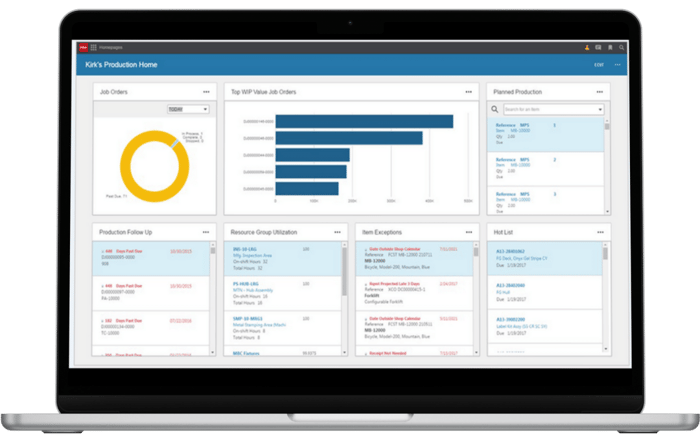
Infor CloudSuite is one of the more popular cloud-based ERP choices on the market today. In fact, they come in at #4 in terms of ERP market share. Infor CloudSuite is very strong with customers within the Food & Beverage, Aerospace & Defence, Fashion/Apparel, and Industrial Manufacturing industries.
CloudSuite offers tremendous flexibility in large part due to numerous ERP acquisitions such as Baan (Manufacturing ERP) and more recently Lawson which was very popular with government and non-profits. Some clients may find that CloudSuite has a less modern look and feel with their user interface and those highly concerned about end-user adoption may find other solutions more visually appealing. That being said, Infor CloudSuite’s capabilities rival that of Oracle, SAP, and Dynamics 365 F&O with very strong capabilities around configure, price, quote (CPQ), being able to quickly and easily translate a sales order/proposal into a work order and predictive analytics capabilities that help make the purchasing and management of inventory much more easily and accurately.
Infor CloudSuite Customer Reviews:
“Great tool! On time performance, reduced inventory levels by implementing lean practices using APS. We are able to have real time postings and financial tracking. The flexibility of the system allows each user to get the details and use the system very user friendly way. ” Source: Gartner Peer Insights
What Do the Analysts Say?

While Infor was listed as a Niche Player in the most recent Magic Quadrant for Cloud Core Financial Management in 2021 they were also listed as a leader for Enterprise Asset Management (below) in 2019 for Enterprise Asset Management Software performance.
For asset-intensive organizations looking for both a cloud-based ERP and EAM solution, both Infor (and IFS) provide highly competitive solutions that span both ERP and EAM.
Infor was also featured as a Leader in the Magic Quadrant for the Product-Centric Enterprises category in 2021.
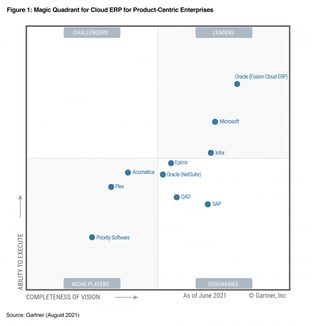
Gartner goes on to say…
In its 2021 Magic Quadrant for Cloud ERP for Product-Centric Enterprises, Gartner notes that, “The ERP for product-centric enterprises market is accelerating its transition to cloud deployment models. ERP application leaders should use this Magic Quadrant to evaluate cloud ERP application suites as part of a composable ERP strategy.”
Infor’s CloudSuite commitment to industry-specific ERP solutions, by delivering faster time to value, is paying off in a big way. Its market share growth and analyst reviews are a direct reflection of this focus.
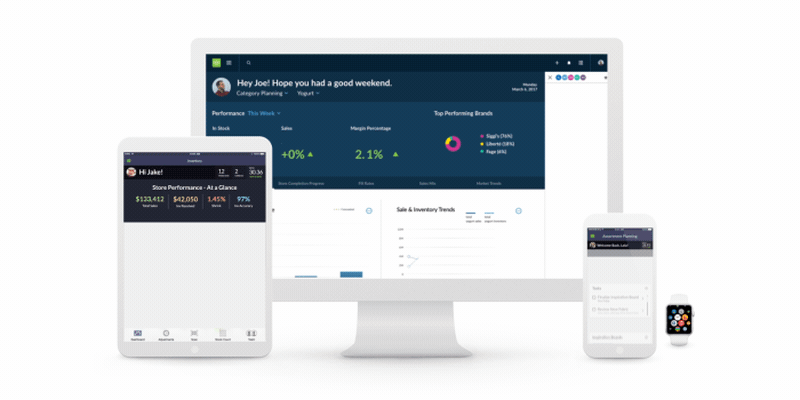
Infor M3 is an Enterprise Resource Planning (ERP) software designed for medium to large-sized global manufacturers, distributors, and after-sales service providers. It is a comprehensive solution that supports the complex and varied needs of industries including fashion, food and beverage, chemical, equipment, and distribution. Developed by Infor, a global leader in business cloud software products for companies in select industries, Infor M3 is known for its flexibility, scalability, and industry-specific capabilities.
Key Features and Capabilities:
Infor M3 stands out for its user-friendly interface, adaptability to various business processes, and its cloud-first approach, allowing businesses to leverage the benefits of cloud computing for scalability and efficiency. It's built on modern technologies that support integration with other systems and platforms, ensuring that businesses can adapt to changing market demands and technological advancements.
Infor M3 Customer Reviews:
“Great service overall from Infor, consultant team provided us with the right knowledge to learn the system and take ownership of configurations. Implementation Accelerators helped us start the project on the right track. The support Team from Infor has always been extremely responsive. Product and Development teams have done a fantastic job working on challenges we faced along the way. Moving to the M3 Cloud Edition provided us with hundreds of new features and APIs to streamline the business. What did not work well: The learning curve was quite steep for the Service Provider and us as the customer. A large number of enhancements to the software and architecture became difficult to keep up for everyone involved in the project. ”
Source: Gartner Peer Insights
Company Profile:
Headquarters: Newcastle upon Tyne, United Kingdom
Ownership: Public
Stock Ticker: SGPYY (OTCMKTS)
Number of Employees: 13,400
Annual Revenue: 1.903 billion GBP
Sage Group, with its established presence in the enterprise resource planning (ERP) software industry, is recognized as a leading multinational corporation headquartered in the United Kingdom. As the nation's second-largest technology entity, Sage has carved a significant niche for itself on the global stage, positioning itself as a formidable competitor in the ERP market. Its strategic placement as the third-largest provider worldwide is a testament to its robust product offerings, innovative solutions, and unwavering commitment to customer satisfaction, trailing only behind industry giants SAP and Oracle.
Sage's extensive portfolio, tailored to cater to the complex and evolving needs of businesses, ranges from accounting and payroll solutions to comprehensive cloud-based ERP systems. This diversity in product offerings enables Sage to serve a wide array of industries, including manufacturing, retail, and services, thereby reinforcing its market position and enhancing its global footprint.
The company's focus on research and development is evident in its cutting-edge solutions that integrate the latest technologies, such as artificial intelligence (AI) and machine learning, to streamline business operations and foster efficiency. Sage's dedication to innovation not only drives its growth but also empowers its clients to stay competitive in rapidly changing market landscapes.
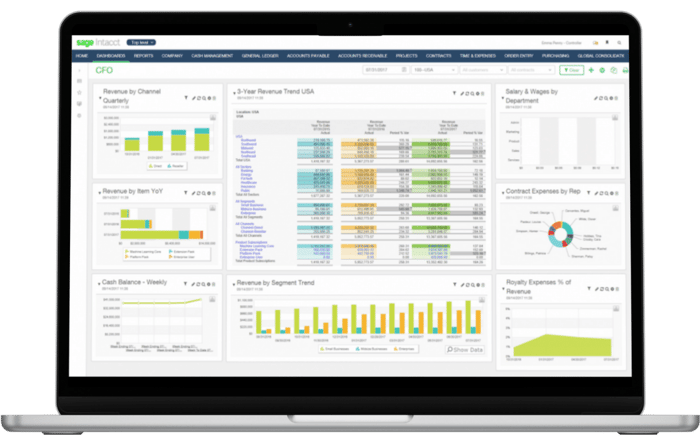
While Sage Intacct is not a complete ERP, it was featured in the 2023 Gartner Magic Quadrant for Cloud ERP for Service-Centric Enterprises. Sage Intacct is a popular choice among lower-midmarket enterprises in North America and certain European regions, primarily for its robust financial management features. Among its notable functions is the continuous auditing feature, which efficiently identifies irregularities.
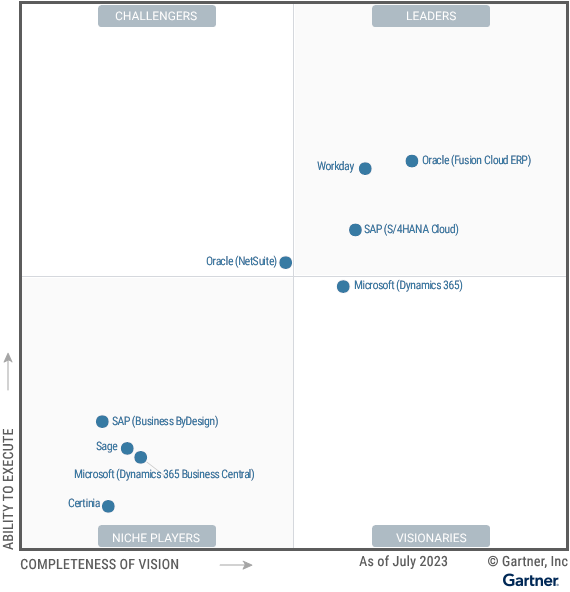 Gartner highlights such innovations as a key strength, along with its integrated financial planning and analysis capabilities. However, Gartner also points out areas of concern, such as Sage's limited global presence, its basic native HR functionalities, and the absence of a comprehensive procure-to-pay (P2P) solution.
Gartner highlights such innovations as a key strength, along with its integrated financial planning and analysis capabilities. However, Gartner also points out areas of concern, such as Sage's limited global presence, its basic native HR functionalities, and the absence of a comprehensive procure-to-pay (P2P) solution.
Sage Intacct is accounting and financial management software that can be deployed via several options (cloud, SaaS, or web). Core financials are easily accessed and users can leverage integrated management and financial reports across the enterprise. Sage Intacct’s focus is on automating the most important processes, reducing reliance on spreadsheets, and providing greater visibility into performance.
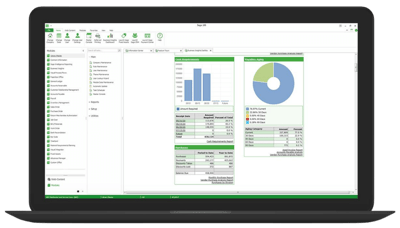
If your small to medium-sized business (SMB) is in discrete manufacturing, wholesale distribution, or professional services, Sage 100cloud is worth a look. With options for cloud, SaaS, web, or on-premise deployment, it offers tools for accounting, manufacturing, distribution, and inventory management. Users say it’s a leap ahead from earlier Sage products and can be easily customized to adapt to your growing needs. Businesses that control inventory to drive financial results might find it a particularly good match.
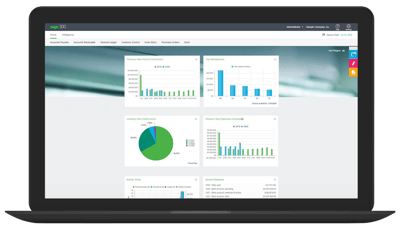
For more complex organizations, Sage 300cloud manages multiple locations across multiple regions, currencies, countries, and languages. Financial reporting and analysis modules cover multiple business units, subsidiaries, companies, and regions.
With various deployment options, Sage 300cloud is great for businesses in certain industries: operations and inventory management, professional services, wholesale and distribution, manufacturing, public sector, not-for-profit, hospitality, and retail.
Not a full-blown ERP but certainly more affordable, Sage 300cloud helps businesses manage finance and accounting needs. Sales order management, inventory tools, and integrated payments are also featured benefits. The product takes the complexity out of managing business finances across borders with General Ledger (GL) capabilities that ease some of the pain points that occur when organizations span international lines.
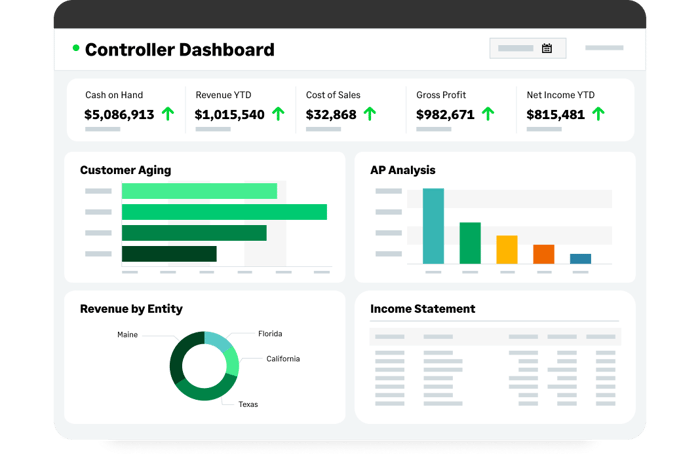
Sage’s flagship, cloud-based ERP product is laser-focused on delivering ERP solutions to companies in the $50M-500M revenue range. Sometimes referred to as Sage X3 or Sage Business Cloud Enterprise Management, it gives manufacturers the ability to tightly integrate all their processes across multiple entities, countries, currencies, and languages.
Sage X3 offers everything you would expect from an ERP solution, including CRM, accounting, inventory, and shop floor management. PE and private family-owned companies tend to be a particularly solid fit for X3 due to its attractive price point to license, implement, and maintain.
Businesses that fall in the middle ground, too intricate for tier 3 ERP solutions like SAP BusinessOne or Intacct, yet not overly complex to necessitate a tier 1 ERP system such as SAP or Oracle, could discover a perfect fit with Sage X3.
Any size of business can benefit from its robust production management, supply chain management, financial management, and collaboration utilities. X3 helps users manage workflows across multiple sites and personalize their workspace access to include only relevant data.
Sage X3 also integrates with mobile devices for a simple cloud solution on the go. Product-centric industries including discrete manufacturing (MTS & MTO), process manufacturing (batch), and distributors including wholesale and transportation will find appealing features within the system.
Sage Business Cloud X3 Customer Reviews:
“My overall experience has been superb with Sage Business Cloud Enterprise Management (Formerly Sage X3). We can use vendor/customer creation, recurring, general ledger recurring, Bulk Item import, financial Budget, Requisition Approval console and purchase order and invoice creation. We can manage accounting, create financial reports and Item reports anywhere." Source: Gartner Peer Insights
Company Profile:
Headquarters: Linkoping, Sweden
Ownership: Private
Number of Employees: 4,000
Annual Revenue: Unknown
IFS is a PE-held, European ERP company whose name may be unfamiliar to North American ERP buyers. While its brand recognition may not be as pronounced in the North American markets, IFS commands a significant presence on the global stage boasting a large workforce of over 4,000 employees and more than 10,000 customers spread across several industries globally.
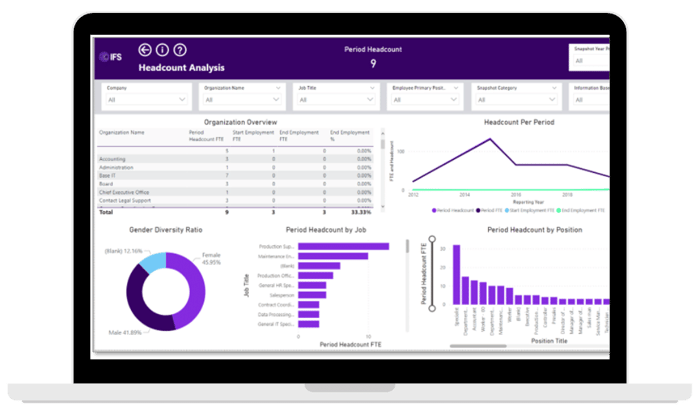
IFS Cloud ERP is a highly capable ERP solution for businesses looking for a modern, cloud-based ERP that also tightly integrates with best in class Enterprise Asset Management (EAM) and Field Service Management (FSM) capabilities.
IFS is laser-focused on solutions for these industries:
IFS can be run in various configurations, either in the Cloud, on-premise or as a hybrid. One thing that customers like most about IFS is its ability to streamline all aspects of ERP. IFS integrates operations for a variety of workflows, cutting down on internal snags. It doesn’t silo functions as much as other vendors’ systems: Enterprise Asset Management (EAM) and Field Service Management (FSM) is inherently built-in to the programming.
The IFS Cloud ERP software architecture addresses the entire modern business value chain. Businesses that seek digitization to better compete in today’s market will find that IFS does a nice job of integrating and adopting disruptive technologies such as the Internet of Things (IoT), Artificial Intelligence (AI), mobility, and augmented reality (AR).
The system is comprehensive right out of the box; it provides everything that companies need. IFS Modules include financial management, engineering, manufacturing, project management, supply chain management, maintenance, human capital management, and sales and service.
Automated digital workflows enable organizations to effectively plan their workforce capacity and schedules ahead of time. Given the fast-paced nature of today's market, these systems offer real-time analysis, empowering users to react promptly to immediate challenges without the burden of manual paperwork.
IFS Customer Reviews:
“Over the years IFS has proven time and time again that they are a customer-centric vendor with a focus on driving efficiency, usability, and flexibility for their customers. Their growth has been steady while staying true to their values. Many years later I can honestly say buying IFS was an excellent business decision that we have never regretted.” Source: Gartner Peer Insights.
What do the analysts say about IFS?
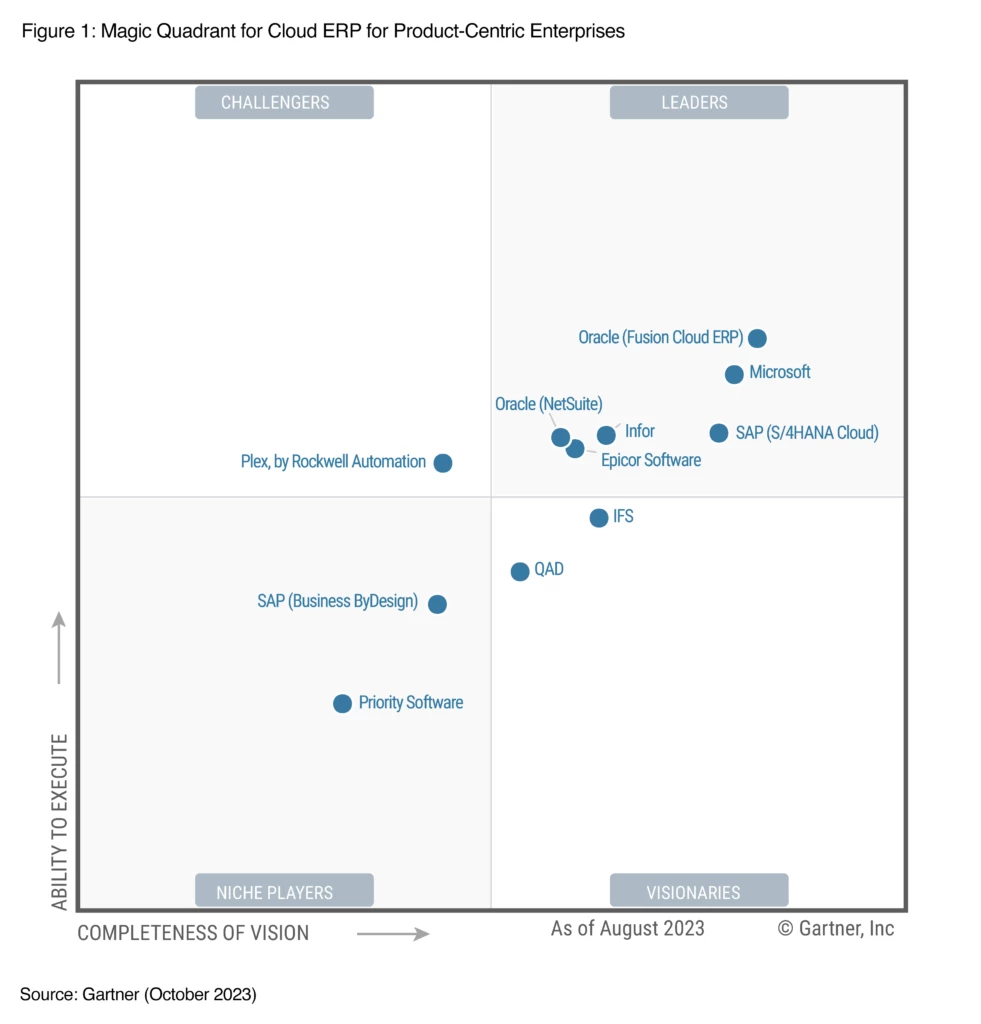
IFS has been recognized as a Visionary in the Magic Quadrant, with its IFS Cloud solution evaluated for its strong focus on midsize to large customers in EMEA and North America. The platform has seen significant innovations, notably in MES capabilities and an API integration strategy that allows for advanced analytics through deep data granularity and interactive graphics. Future directions for IFS include enhancing process automation and developing intelligent scheduling for sustainable smart factories.
Strengths of IFS Cloud include its broad capabilities across moderate to complex manufacturing contexts, integrating MES, EAM, and field service management with investments in digital twins, AI, and advanced simulation. The IFS Connected Factory strategy enhances shop floor integration by connecting equipment to the ERP for real-time planning and execution, boosted by AI/ML for superior shop floor management. Additionally, IFS offers flexible integration strategies through IFS Cloud Designers and third-party apps, facilitating customized solutions and real-time data integration.
However, potential users should be cautious about several factors. IFS's focus on EMEA and North America may limit localization options for companies operating outside these regions. The adoption rate of IFS Cloud is trailing behind other vendors in the quadrant, which might impact the operational experience for customers. Lastly, while IFS has traditionally managed customer implementations, there is a strategic push towards leveraging its growing partner network. Prospective customers should thus carefully assess the capabilities and references of partners for implementation and support.
Company Profile:
Headquarters: Austin, TX
Ownership: Private
Number of Employees: 4,100
Annual Revenue: Unknown
Epicor Software Corporation is a global technology company that specializes in developing business software solutions for manufacturing, distribution, retail, and services organizations. With its headquarters in Austin, Texas, Epicor serves customers in over 150 countries and offers products that are designed to improve efficiency, performance, and profitability for businesses of all sizes.
Founded in 1972, originally under the name General Automation, Epicor has evolved through a combination of organic growth and strategic acquisitions. Its product portfolio includes enterprise resource planning (ERP), human capital management (HCM), supply chain management (SCM), and retail management software, among others. These solutions can be deployed in the cloud, hosted, or on-premises, giving businesses flexibility in how they implement and use Epicor's products.
Epicor's approach emphasizes industry-specific functionality and expertise, ensuring that its software solutions meet the unique needs of the sectors it serves.
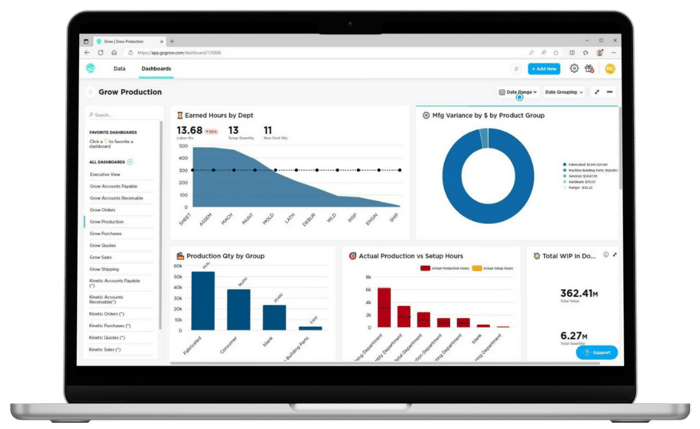
Epicor Kinetic ERP
The Epicor ERP 2021.1 release rebrands its flagship ERP solution as “Kinetic,” likely influenced by the recent Clayton, Dubilier & Rice private equity acquisition. Kinetic has been refreshed and re-designed to be a more formidable competitor against modern, cloud-based ERP leaders such as SAP and Oracle, and is evidence of the company’s ‘cloud first’ initiative.
Kinetic’s focus is on industry-specific productivity solutions, specifically in the Automotive, Building Supply, Distribution, Manufacturing, and Retail sectors. The newest update includes functional improvements and is largely focused on providing a better user experience, designed to drive increased user efficiency and productivity.
Their enhanced search functionality now includes predictive search results as well as other enhancements geared towards manufacturers, who must ensure compliance with FDA and CMMC regulations.
A downloadable mobile app functions from anywhere. It features EVA, the Epicor Virtual Agent, which allows users in the field to interact with the system through voice commands or texts. Users can ask questions and get instant answers, streamline quoting and scheduling, and receive targeted recommendations.
Kinetic itself is 100% browser-based and gives users a UI Customization Tool (App Studio) that’s also browser-based. Companies can make changes and customizations to screens based on their own business needs in a low-code/no-code environment.
Kinetic is deployable in the cloud, on-premises, or in a hybrid format. Their new public cloud helps companies accelerate collaboration and leverage a single source of truth.
If you’re in manufacturing, you know how hard it is to let go of old systems and old processes. Kinetic really strives to give manufacturers real-time visibility into all areas of the business, such as the ability to spot hidden opportunities, plan product runs, balance and distribute work across employees, collaborate with suppliers, and respond to changing shifts in demand.
Robust, built-in analytics help manufacturers expand their footprint and gain market share. The system is customized to support users as they grow and change. Kinetic spurs growth and manages complexity by offering full capabilities for HCM, financial management, CRM, sales, design and engineering, product management, scheduling/planning, supply chain, production management, and customer service management.
Customers say that Epicor is intuitive, a great value and that its management is responsive and adaptable to the changing needs of the market. On the downside, other users complain that an increased focus on cloud architecture is missing the mark.
Epicor Kinetic Customer Reviews:
“The discrete manufacturing feature set is likely best in class, even when compared to the likes of Oracle and SAP. The product suite/feature set and technology stack is a B+/A- rating for the manufacturing industry. They do the major things extremely well in the discrete manufacturing space and offer some unique attributes that set the product offering above competition.” Source: Gartner Peer Insights
What Do the Analysts Say?

Epicor Software Corporation was named a Challenger in the 2022 Gartner Magic Quadrant, based on product-centric enterprise resource planning (ERP) products offered for deployment as cloud service applications.
Customers have commended Epicor for offering a reliable ERP solution tailored for the operational needs of midsize manufacturing and distribution enterprises, along with supplementary capabilities in demand planning, inventory, and warehouse management. Additionally, Epicor Cloud ERP is recognized for its versatility across key sectors such as manufacturing, distribution, retail, consumer packaged goods, and construction. Midsize manufacturing firms stand to gain from Epicor's sector-specific knowledge, implementation accelerators for core functionality, expertise in discrete manufacturing (notably its configure, price, and quote [CPQ] capabilities), and a unified user interface.
Company Profile:
Headquarters: Bellevue, WA
Ownership: Private
Number of Employees: 300
Annual Revenue: Unknown
Acumatica is a leading cloud-based enterprise resource planning (ERP) software provider, offering a comprehensive suite of business management applications. Established in 2008 and headquartered in Bellevue, Washington, USA, Acumatica caters to the needs of small and mid-sized businesses across a variety of industries, including manufacturing, distribution, retail, and services.
.webp?width=700&height=405&name=general_screenshots-1%20(1).webp)
Unlike most providers, Acumatica is not a legacy system that’s been adapted to fit new technology. Acumatica is a born-in-the-cloud application that’s been around since 2008. From the start it’s been accessible through the cloud and on-premises, using the latest web technology. The company claims to be the fastest-growing cloud ERP company for six years running.
Growing, small-to-mid market organizations find that Acumatica delivers flexibility, efficiency, and enables greater continuity of operations. Acumatica offers industry-specific tools and sophisticated cross-module workflows to make business more efficient. And a mobile app allows remote and field workers to access and input data no matter where they’re located.
The system is built to handle the unique needs of multiple industries, especially construction, distribution, manufacturing, retail-commerce, software and technology, and other professional and industrial services.
Collaborating is possible thanks to a shared single source of truth data and cross-team workflows, and Artificial Intelligence (AI) plays a role in driving automation and improving efficiency. The platform is specifically designed to make it easy for companies to meet evolving business needs.
Acumatica is ready to go off the shelf, but it also allows for the integration of other tools and software that your business may already be using. There’s also an Acumatica Marketplace where you can shop for the plug-ins you need, or you can develop your own with user-friendly custom integrations and open API architecture. You don’t need to be a coder to make changes through their low-code/no-code visual interface.
Data can be hosted on a public or private cloud and unlike some other providers, you’re not forced to use the Acumatica database. It offers anytime access to data and flexible licensing options, and the pricing model does not add cost for additional users. The company refers to the product as “Acumatica Cloud ERP.”
Acumatica ranks high in user experience and usability, which makes it easy to drive adoption and collaboration across your company. Users find Acumatica’s intelligent, industry-focused business functionalities useful, especially with productivity aids geared toward commerce, construction, distribution, field service, and manufacturing. The user interface is highly intuitive and online reviews state that it’s easy to tailor the app to specific business processes.
Acumatica Cloud ERP Customer Reviews:
“Acumatica Cloud ERP is well designed for growing small and mid-market organizations. They empower small and mid-size businesses to unlock their potential and drive growth. It’s very easy to integrate with the collaboration tools and an amazing API. We like the cost model with unlimited users. Also we can track prices, check available inventory, apply discounts, enter quotes, create shipments, and fulfill sales orders. Acumatica has well-defined online documentation and training.“ Source: Gartner Peer Insights
What Do the Analysts Say?
Acumatica, although not classified as a Leader by Gartner in recent assessments, boasts an impressive overall user rating of 4.7. It was acknowledged as a "Niche Player" in the 2021 Gartner Magic Quadrant for Cloud Core Financial Management Suites, transitioning from its previous "Visionary" status in 2019 and 2020.
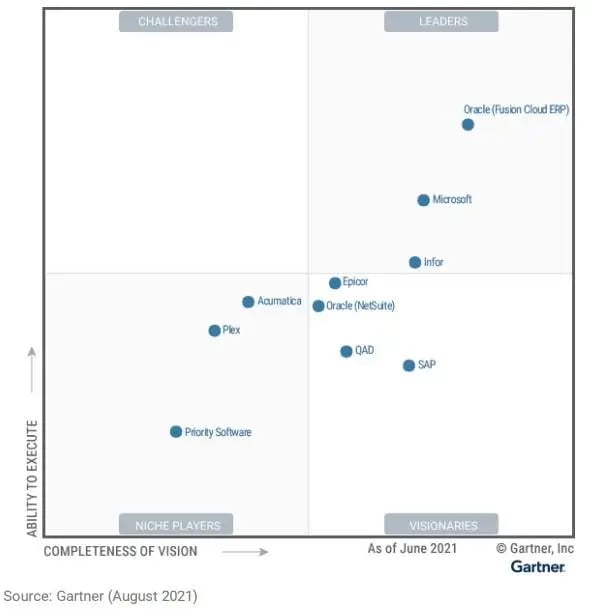
Acumatica Areas of Concern
Acumatica ERP is a cloud-based business management solution that offers adaptability and comprehensive features. However, before diving into implementation, users and organizations should carefully consider certain areas of concern. The usage-based pricing model can lead to unpredictable monthly expenses for businesses with high transaction volumes, while extensive customization options may require external consultants or specialized in-house teams, increasing costs and implementation time.
Integrating Acumatica with other systems can be technical and may require custom development work, adding to the complexity of the process. The comprehensive nature of the ERP also results in a significant learning curve, necessitating time-consuming and costly training for users. Additionally, the level of customer support can vary depending on the issue's complexity and the chosen support plan, potentially impacting business operations.
To fully leverage Acumatica ERP and meet their needs, organizations must engage in careful planning, budgeting, and resource allocation. By addressing these concerns proactively, businesses can harness the power of Acumatica ERP while minimizing potential drawbacks, ensuring a successful implementation and long-term benefits.
Company Profile:
Headquarters: Pleasanton, CA
Ownership: Public
Stock Ticker: NASDAQ: WDAY
Number of Employees: 3,700
Annual Revenue: $4.32B
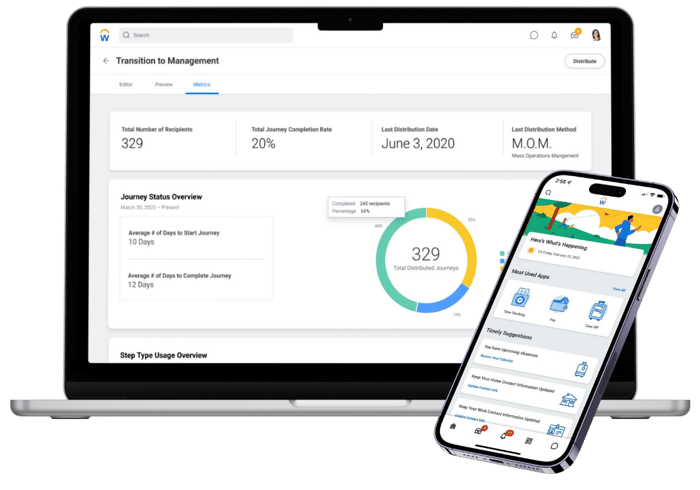
Workday may not be a household name, but they’re a company to watch. For Workday, it’s all about managing change. Their ERP model is based on helping organizations deal with change, and to improve the way employees deal with change– something that other companies tend to gloss over.
Workday is a cloud-native system with finance, HR, planning, and analysis capabilities. User dashboards provide help to gain insight, respond to change, and work more efficiently through a unified data approach. Personalized dashboards distribute analytics, allowing users to drill down and pivot as needed, based on assigned roles.
Machine learning is built into the system, along with continuous anomaly detection. Their HCM module is a bright spot of the package– known for its excellence in identifying employee skill sets and helping to plan for changes.
At a time when businesses are seeing huge challenges with staffing, Workday’s vision is helping drive the shift from HR systems based on jobs and connections to HR strategies based on skills.
Workday isn’t only for HR management – it also offers an ERP system with excellent human capital management capabilities. The recent acquisition of Adaptive Insights resulted in an even better product that specializes in planning and budgeting. Workday ERP serves organizations operating in technology, communications, manufacturing, healthcare, life sciences, higher education, financials, insurance, retail, media and entertainment, hospitality, professional and business services, and energy.
Workday is all about helping companies stay ahead of new business models, and new competition, and gain insight into changing approaches to business.
Workday Customer Reviews:
“Workday is our all-inclusive single source system that meets our various talent needs – payroll, benefits, compensation, time tracking, absence management, recruitment, talent and performance management, learning, etc.- and has the agility and power of data analytics to uncover the stories and opportunities for improvement. We appreciate the ability to configure the system to suit our needs and timelines- not where we need to fit our initiatives into a vendor’s timeframe. Workday is consistently iterating and improving, which allows us to be agile and deliver even more for our leaders and team members.” Source: Gartner Peer Insights
Workday has a 97% customer satisfaction rating, receiving a 95% or higher for the past ten years. They claim to deliver their solution on time, and on budget. They also have a flexible education program for training at an engagement level that’s right for your organization. Positive reviews bring up mobile accessibility, customer support, financial model building, frequent product updates, data organization, forecasting, ease of use, and robust budgeting.
Critical reviews mention issues with drill-down capabilities, limited dashboard formatting, struggles with multi-currency implementation, and some confusion between Excel and Workday’s UI.
What Do the Analysts Say?
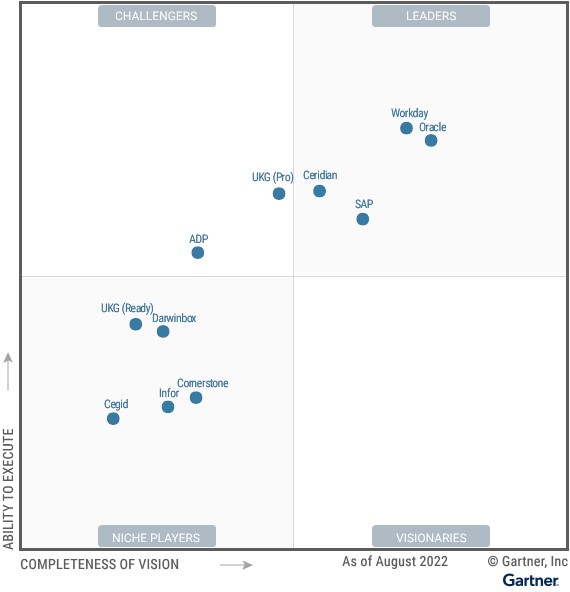
The 2022 Cloud HCM Magic Quadrant highlights leaders in the Cloud HCM sector, including Workday, Oracle, Ceridian, and SAP. Workday stands out for integrating its HCM suite with ERP functionalities like planning and finance, offering strong integration options. Gartner praises Workday as the top vendor for employee experience, citing its innovative Value Inclusion Belonging and Equity index and sentiment analysis features.
Workday Areas of Concern
While Workday ERP is a powerful and comprehensive software solution, many users cite concerns about the complexity of its implementation and configuration process. Getting Workday up and running to meet specific business needs can be a lengthy and challenging undertaking, often requiring a significant time investment to configure correctly.
The success of a Workday implementation heavily relies on having a well-thought-out strategy and possibly seeking assistance from Workday professionals or consultants. This complexity can be attributed to the comprehensive nature of the software, which, while feature-rich, may require specialized expertise to set up optimally.
Another concern frequently expressed by customers is related to Workday ERP's customization capabilities. Compared to some of its competitors, Workday has a more standardized approach to its platform, which can limit the extent to which it can be tailored to fit unique business processes or requirements. For companies with highly specialized needs, this can present challenges in adapting the software to perfectly align with their operations.
Businesses considering Workday ERP should carefully evaluate their implementation and customization requirements, weighing the powerful features of the software against the potential complexity and limitations in these areas. Proper planning, resource allocation, and partnerships with experienced professionals can help mitigate these concerns and ensure a successful Workday ERP deployment.
Company Profile:
Headquarters: Troy, Michigan, United States
Ownership: Rockwell Automation
Stock Ticker:
Number of Employees: 550
Annual Revenue $232 Million
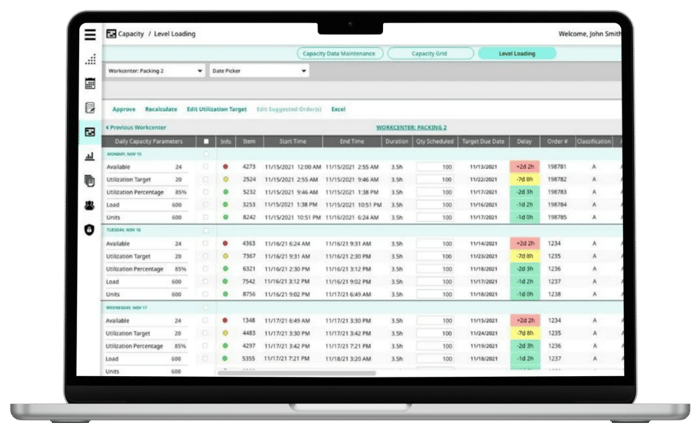
Plex Systems specializes in ERP for the manufacturing industry that connects, automates, tracks, and streamlines business processes from “ the shop floor to the top floor”. The Plex Smart Manufacturing Platform manages and tracks production for businesses in the manufacturing industry and connects people, systems, machines, and supply chains.
The Plex Smart Manufacturing Platform is utilized by automotive, food and beverage, precision metal forming, plastics and rubber, industrial manufacturing, high-tech electronics, and aerospace industries. It’s designed to streamline production, track inventory and give managers a better overview of who’s doing what, where, and when.
Users have access to the Help Desk, 24/7 chat, and phone support. Training is live online and includes webinars, videos, and documentation.
Languages supported: Arabic, Chinese (simplified), Chinese (traditional), Czech, Danish, Dutch, English, Finnish, French, German, Greek, Hebrew, Hindi, Hungarian, Italian, Japanese, Korean, Norwegian, Persian, Polish, Portuguese, Russian, Spanish, Swedish, Tamil, Thai, Turkish, Urdu
Plex Smart Manufacturing Customer Reviews:
“Plex is a product that is best-in-class for manufacturing, operations, execution, logistics, and supply chain. The implementation process is easy, though there are only a handful of partner organizations on the market. Plex further has functions that span across all traditional ERP areas, such as accounting, advanced quality, supplier portals/EDI, business intelligence, purchasing, time tracking, and sales that are good but not the core focus of the product. We generally found these features to be satisfactory-to-good. Plex has additional features that could be described as HCM, CRM, or advanced Accounting (Fixed Assets, Expenses, Consolidations), though those features are most likely only beneficial to small organizations.” Source: Gartner Peer Insights
What do the analysts say?
Organizations with fewer resources often need reliable core functions without oversized licensing fees. The vendors below focus on straightforward deployment, flexible payment structures, and intuitive features suitable for small to mid-sized teams.
Odoo offers a modular ERP suite that covers core areas such as accounting, customer relationship management, manufacturing, and e-commerce. As an open-source platform, it allows smaller firms to minimize licensing expenses while maintaining access to enterprise-grade functionality.
Many businesses begin with a minimal set of applications and expand gradually as needs evolve, avoiding unnecessary complexity early on. The system’s adaptability and strong community support make it a practical choice for companies seeking incremental digital transformation without large upfront investments.
Zoho delivers a cloud-based ERP framework that combines accounting, project management, and inventory control into one cohesive system. Its modular structure helps limit initial costs, making it easier for small businesses to adopt only what they need.
Seamless integration with Zoho’s broader ecosystem—including tools for HR, analytics, and email—simplifies data flow across departments. As a result, businesses can streamline operations and reduce reliance on third-party connectors or manual processes.
SAP Business One is a comprehensive ERP solution tailored for small to mid-sized businesses. Designed to grow alongside companies, it offers robust financial management, sales, inventory, and customer relationship management (CRM) features.
Unlike SAP’s enterprise-level solutions, Business One is simpler to implement and maintain, while still providing advanced analytics and reporting tools. Its modular design allows businesses to add functionality as needed, ensuring they only pay for what they use.
SAP Business One is especially popular among manufacturing and distribution companies that require strong supply chain visibility and operational control. With both cloud and on-premise deployment options, it provides flexibility for growing businesses looking to scale.
Sage 100 is an ERP solution designed for small and mid-sized companies seeking a reliable, industry-specific system. It offers strong accounting, inventory management, and business intelligence capabilities, making it a practical choice for manufacturers, distributors, and service-based businesses.
One of its standout features is its flexibility — Sage 100 can be customized to meet the unique needs of different industries. Businesses can also integrate third-party applications to expand its functionality without migrating to a more complex ERP system.
For companies managing product lifecycles and supply chains, Sage 100’s real-time data insights and automated workflows can enhance decision-making and operational efficiency.
As we step into 2025, the ERP landscape continues to evolve, driven by technological advancements and shifting business needs. These developments make it an exciting time for organizations seeking to leverage ERP systems for operational efficiency and strategic growth.
While traditional ERP systems aim to provide an all-in-one suite, businesses in 2025 are increasingly adopting a best-of-breed approach. Instead of relying on a single vendor for every function, companies are selecting specialized applications that excel in specific areas like financial management, customer relationship management (CRM), or supply chain optimization.
This shift is largely made possible by the growth of Integration Platform as a Service (iPaaS) solutions. iPaaS tools act as a connective layer, facilitating seamless data flow between different applications. Platforms like MuleSoft, Boomi, and Celigo allow businesses to achieve real-time integration without heavy reliance on internal IT resources.
By leveraging best-of-breed solutions, companies can remain agile, benefiting from specialized innovation while maintaining a connected ecosystem. For industries with rapidly changing needs or unique operational requirements, this approach often results in better performance and faster ROI compared to the implementation of large, monolithic ERP systems.
As iPaaS solutions continue to evolve with improved automation and AI-driven integrations, this trend is expected to accelerate, empowering organizations to build resilient, adaptable technology stacks that drive operational excellence.
As companies explore AI use cases within their ERP ecosystems, one of the most significant hurdles they encounter is the challenge of preparing master data. While establishing structured data during a new ERP implementation is often manageable, businesses using fractional ERP solutions — typically consisting of core financial modules integrated with various third-party applications — face greater complexity.
Master data management (MDM) is essential for ensuring AI systems have access to clean, consistent, and reliable data. AI algorithms rely heavily on accurate data to generate actionable insights, automate decision-making, and predict future trends. However, fragmented data across different platforms often leads to inconsistencies and data silos, making it difficult for AI to perform effectively.
For many companies, the prospect of implementing a comprehensive master data management platform solely to enable AI can be daunting. The time, resources, and expertise required can delay AI adoption and limit the potential value it can deliver.
Recognizing these challenges, businesses are increasingly exploring AI tools that operate independently of ERP systems. Rather than waiting for perfectly cleansed data, these tools can deliver valuable insights using existing data in its current state.
Solutions like process intelligence platforms leverage AI to analyze operational workflows, identify inefficiencies, and recommend optimizations. By examining process diagrams and transactional data, these tools detect patterns and predict areas for improvement without the need for a fully integrated, centralized data environment.
This approach offers several advantages:
Faster Time to Insights: Companies can generate actionable recommendations without lengthy data cleansing and structuring processes.
Reduced Complexity: AI tools can work with imperfect or incomplete data, applying algorithms to extract meaningful patterns.
Lower Upfront Investment: Businesses avoid the significant expenses of large-scale MDM initiatives, while still benefiting from AI-driven insights.
Improved Business Agility: AI platforms that operate outside the ERP offer flexibility to analyze data from various sources, adapting quickly to evolving business needs.
While AI-driven MDM platforms remain valuable for organizations with long-term data governance strategies, companies looking for faster results often find that external AI tools provide an accessible and scalable alternative. This hybrid approach — combining ERP for core financial operations with AI-powered external analysis — is becoming an increasingly popular choice for businesses seeking to balance cost, complexity, and innovation.
A: Leading ERP solution providers in 2025 include SAP, Oracle, Microsoft Dynamics, and Infor. Each offers unique strengths depending on business size, industry, and deployment preferences. For businesses starting their ERP journey, check out our guide on ERP vendor selection.
A: ERP vendors typically refer to the companies that sell ERP systems, while ERP solution providers often go further, offering consulting, customization, and implementation support in addition to the software itself. Learn more in our post on ERP software selection criteria.
A: The ERP Magic Quadrant is a Gartner research framework that evaluates ERP solution providers based on their vision and ability to execute. It’s a valuable tool for comparing vendors. For insights into post-selection challenges, see where to go after ERP selection.
A: For small businesses, cloud-based solutions like NetSuite or Microsoft Dynamics 365 Business Central are often the best fit due to lower upfront costs and scalability. Before deciding, consider why 55–75% of ERP projects fail and how to avoid common pitfalls.
Selecting the right ERP solution provider is critical, as many initiatives fail to meet expectations when the system isn’t aligned with business needs. The challenge extends beyond addressing current operational demands to ensuring readiness for future technological advancements and market shifts.
To tackle this, organizations should embrace a strategic, needs-focused approach, beginning with a thorough evaluation of their specific requirements, processes, and growth objectives. Essential factors to consider include scalability, customization, integration with existing systems, and support for cutting-edge technologies like AI, machine learning, and blockchain.
The ERP selection process should extend beyond the IT department, engaging stakeholders from finance, operations, human resources, and other areas. A cross-functional strategy ensures the selected system meets the diverse needs of the organization, promoting collaboration and adoption.
RubinBrown’s ERP Vendor Selection Service is crafted to streamline this intricate process. Our team of experts offers tailored, impartial recommendations, guiding you through each phase of the selection journey. From pinpointing the ideal ERP software for your business needs to ensuring a seamless implementation, RubinBrown transforms ERP adoption into a strategic asset for your organization.
Ready to simplify your ERP journey? Contact RubinBrown today to get started with a consultation and move forward with confidence.

Finding the perfect cloud Enterprise Resource Planning (ERP) vendor in 2026 can feel like searching for a needle in a tech-filled haystack. With top...
.png)
1 min read
Indeed, finding the right ERP (Enterprise Resource Planning) software can be complex, with businesses aiming to enhance their operational efficiency...
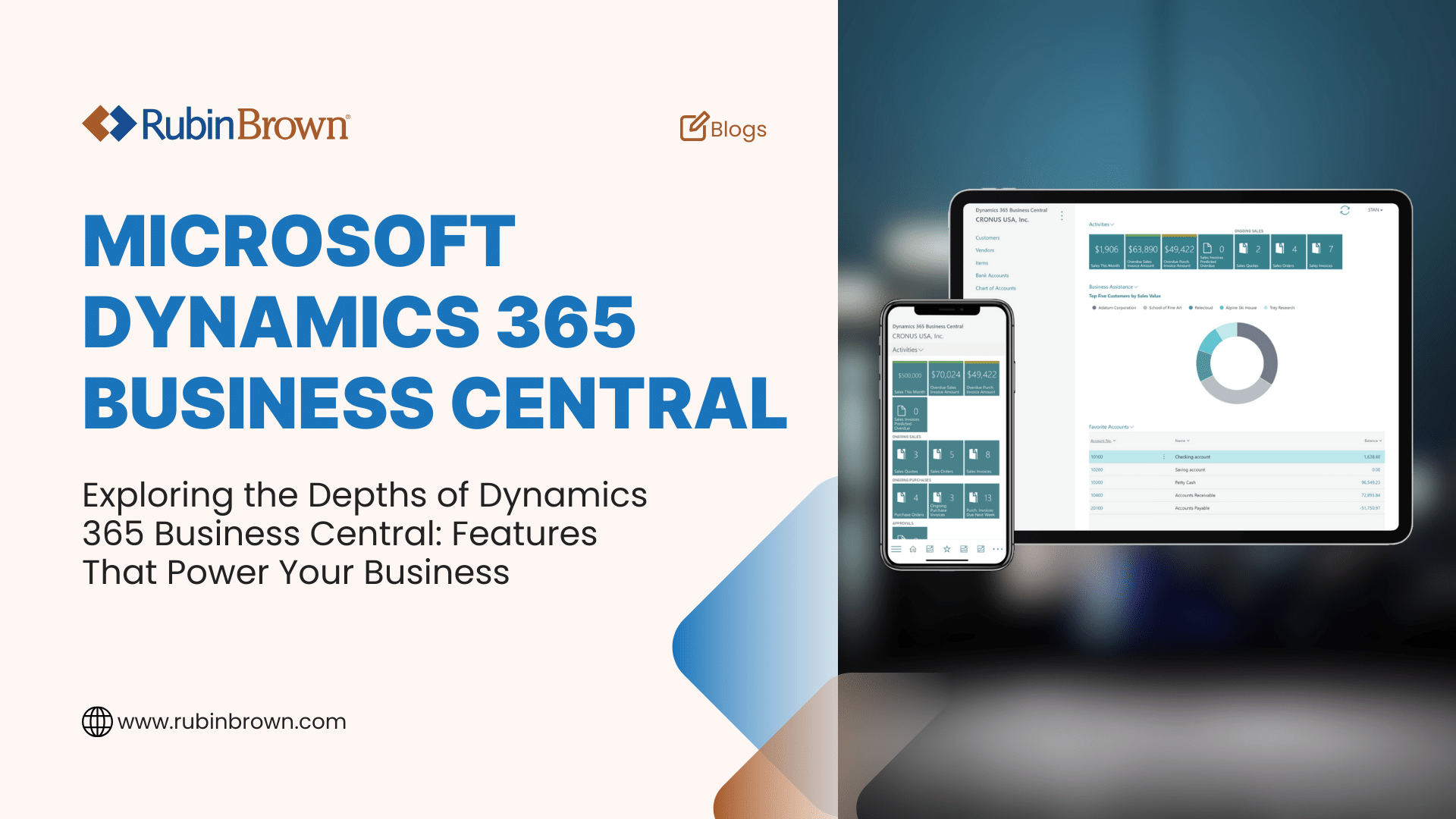
1 min read
Looking for a game-changer in business management? Meet Microsoft Dynamics 365 Business Central. This cloud-based powerhouse is designed for small to...